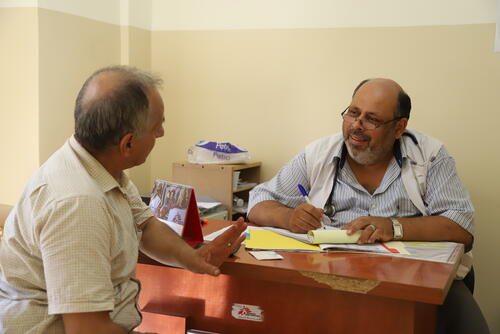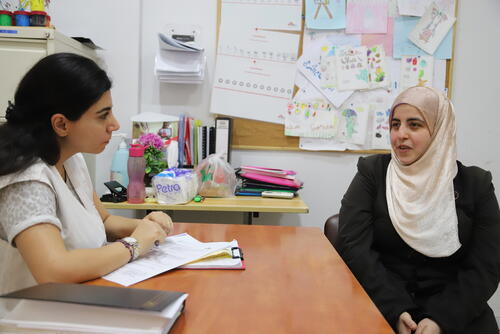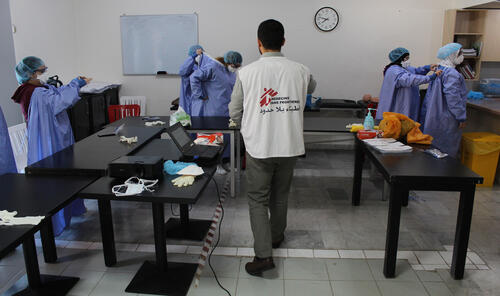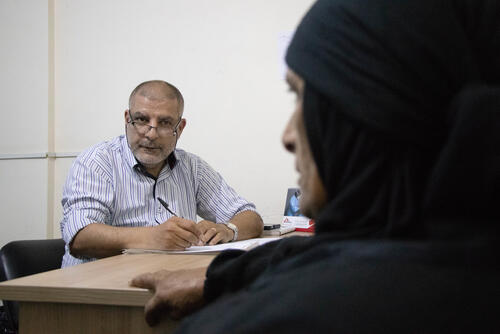Imbalance is witnessed in the mental health sector in Lebanon, as the provision of most mental health services is limited to the private sector, which makes it difficult for the most vulnerable groups to access such services. The primary health care sector does not benefit from enough funding to develop and expand public mental health services and reach remote villages and towns. In an effort to address these challenges, Médecins Sans Frontières (MSF) implemented the Mental Health Gap (MH Gap) programme in two clinics in Tripoli and Al-Abdeh - Akkar at the end of 2017.
The MH Gap programme was initiated by the World Health Organization (WHO). It is adopted by the Lebanese Ministry of Public Health (MOPH) and aims to further enable the primary health care system to provide an integrated package for the treatment of mental, neurological and substance use disorders. To this end, support, training and supervision are offered to non-specialised healthcare providers in view of mainstreaming and facilitating access to these services for those in need.
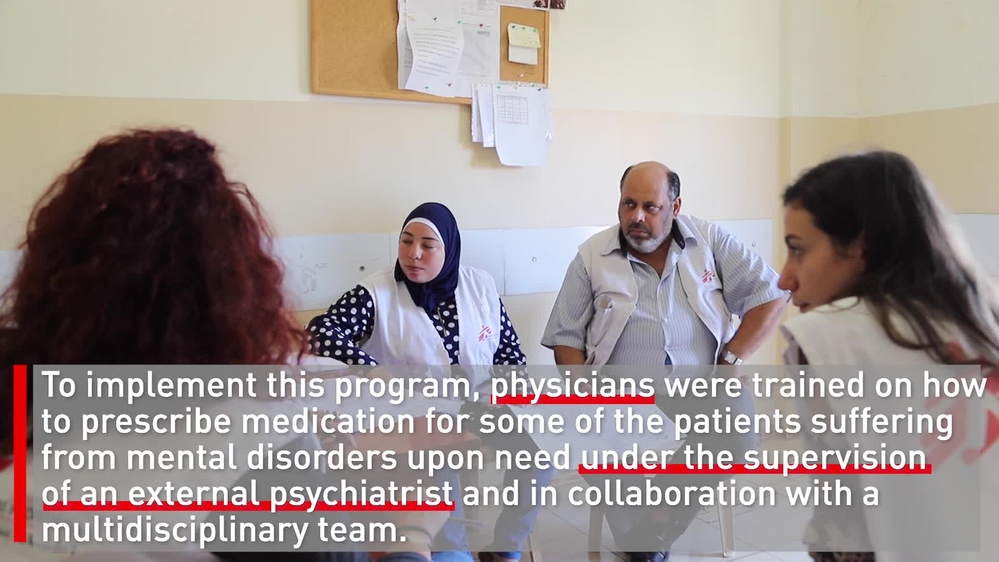
Providing mental healthcare in northern Lebanon
“Mental illness is one of the hardest diseases to suffer from”
“Mental illness is one of the hardest diseases to suffer from”, said Abir, a 40-year-old woman sharing her experience with mental disorders. “It affects all organs, as one would not be able to tell whether they have a headache, tachycardia, or asphyxia. I suffered from such condition for several months.”
“It felt like my life was over… But there is hope, and I have made remarkable progress,” Abir continues. “I couldn't eat, but now I can. I couldn't sleep, but now I can, although the night still frightens me a little, perhaps because I am unable to forget my friend whose loss has deeply traumatised me.”
Abir visited one of our clinics in north Lebanon for the first time with her husband who is still receiving treatment in the chronic disease department. One day, she decided to consult the physician who was treating her husband regarding her problem. The medical examination showed no organic cause for the symptoms, and Abir was therefore referred to the psychologist at the clinic.
Abir started attending psychological support sessions, but kept seeing her husband's physician, as her condition required a treatment plan which covers psychological support sessions with the psychologist, together with treatment using medication prescribed by the physician of chronic diseases at the clinic, in collaboration and coordination with the medical team and an external psychiatrist.
In 2014, MSF integrated mental health services in the free primary health care package provided in our clinics in Lebanon, where psychological counselling was offered by psychologists. As for acute cases requiring treatment with medication, MSF sought to refer people to other organisations.
The implementation of the MH Gap programme in MSF clinics
“In north Lebanon, due to insufficient mental health services, we faced many challenges in referring people with severe mental disorders requiring treatment with medication,” said Anaeelle Saade, the mental health programme supervisor in north Lebanon. “Many patients had to be on the waitlist for too long before they got an appointment, and others had trouble accessing healthcare centres due to distance or transportation cost.”
“To address this challenge, we decided to implement the MH Gap programme,” Anaeelle said. “The purpose is to mainstream and facilitate access to these services for those in need.”
Implementing this programme in Lebanon is of high importance, as it addresses the scarcity of specialised human resources in mental health. According to the WHO Report on Mental Health Systems in Lebanon 2015, the number of psychiatrists is estimated at 71, i.e. 1.26 per 100,000 capita, and the number of psychologists is 193, i.e. 3.42 per 100,000 capita.
To implement this programme, MSF collaborated with the Ministry of Public Health and trained MSF general doctors on how to prescribe medication for some of the patients suffering from mental disorders where needed, under the supervision of an external psychiatrist and in collaboration with a multidisciplinary team.
In our clinics in north Lebanon, and within the framework of this programme, we offer psychological counselling as well as treatment with medication for moderate to severe depression and anxiety, as well as psychosis and bipolar disorder for adults above the age of 18.
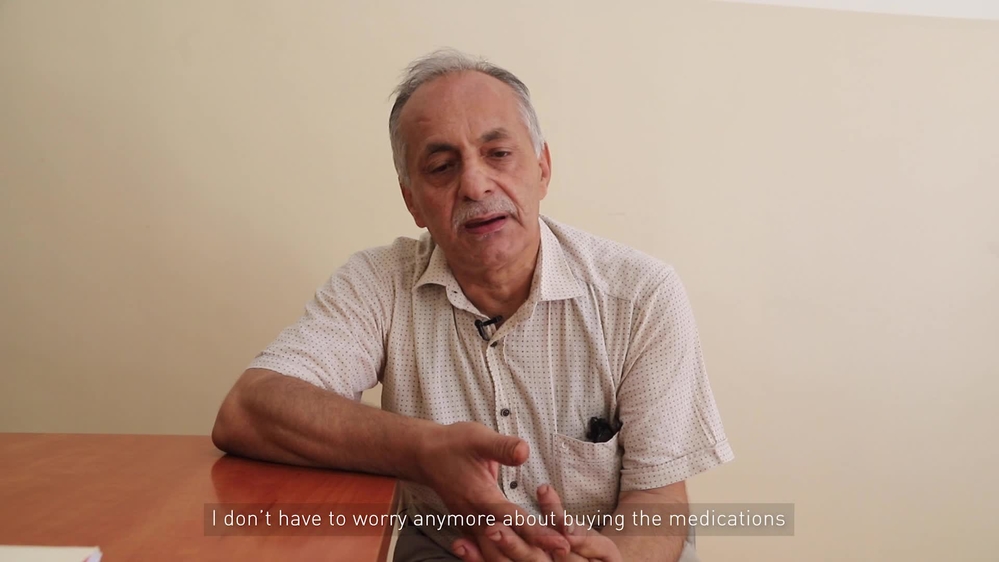
People receiving mental healthcare in Lebanon
Promising results
One hundred and sixty-six patients have benefited from the MH Gap programme between October 2017 and August 2019, which is equivalent to 15 per cent of the total number of patients enrolled in the MSF Mental Health programme in both clinics. Depression accounted for 60 per cent of cases covered under the programme, while acute anxiety accounted for 21 per cent of cases, and the remaining cases represented psychosis, bipolar disorder and other psychological conditions. These figures are indicative of the most common mental disorders.
“When we started implementing the programme in primary healthcare centres, we could quickly and immediately intervene when we noticed that symptoms worsened,” said Liliane Antonios, MSF psychologist in Tripoli. “We were therefore able to reduce the impact and risks of mental disorders on the lives or quality of life of patients. One good example is Abir, who overcame a very difficult phase thanks to her perseverance and commitment to treatment.”
One of the prerequisites for the success of the MH Gap programme is cooperation and integration within a multidisciplinary team of general practitioners, psychologists, nurses and social workers. This further enables the medical team to detect symptoms of mental disorders and collaborate to provide a comprehensive service to patients. Consequently, the patient's mental condition is enhanced, which is reflected in the relevant health indicators.
“When we started working with mental health patients, we realised that many of our chronic patients suffer from a psychological condition which negatively impacts their lives and chronic illness,” said Dr. Ayman Abed El Ghadi, chronic diseases doctor in the Mental Health programme. “I gained the capacity to detect this psychological condition, and upon treatment, we noticed considerable progress in terms of mental and physical health.”
He added: “We collaborate with the psychologist, psychiatrist and programme supervisor to assess the cases and develop a treatment plan. The supervising psychiatrist regularly visits the clinic and is contacted for consultation when needed. This collaboration is very important to maintain the quality of the services we offer.”
It is important to note that, according to our experience, the implementation of this programme in primary healthcare centres has helped in protecting those who need health care services from falling victims to social stigma and shame, since the same physician who provides mental health services and prescribes psychiatric medication also provides treatment and prescribes medication for chronic illnesses. This makes it easier for the patient to ask for help and continue treatment. This is one of the most important positive effects of the programme.
An experience full of challenges
“Although the MH Gap Program gave us the capacity to address the important needs in the field of mental health, we are still facing challenges in terms of treatment provision for severe cases, such as suicidal attempts, which require quick admission to hospital, or cases that require the intervention of a psychiatrist, amid the absence of a referral system where care is constantly provided,” said Anaelle Saade.
“We started mainstreaming this programme in other clinics in remote areas, such as Hermel and Arsal, where we run primary health care clinics,” said Anaelle. “However, the effect will remain limited unless mental disorder treatment programmes are developed within the framework of non-specialised primary care on the national level in compliance with the National Mental Health Strategy 2015-2020.”
MSF first worked in Lebanon in 1976 as part of the emergency response during the Lebanese civil war. It was its first mission in an area of armed conflict. We are currently working towards providing free healthcare in 13 locations in Lebanon, where we run chronic disease, reproductive and mental health programmes, as well as two mother and child care centres. In terms of secondary healthcare, MSF provides paediatric services and non-emergency surgeries in response to the needs of local communities in Lebanon.



